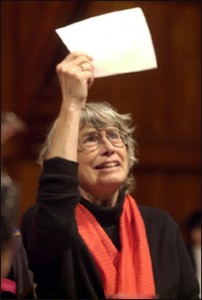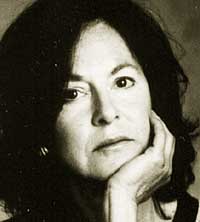Poetry: On “Falling Back”— Six Poems Published in The New York Times Op-Ed Page
Was Sunday, November 7th some sort of equinox? Were there sunspots? Whatever the cause, six poems, to my delight and surprise, appeared in the Op-Ed pages of The New York Times as a feature called “Falling Back.” I’d like to take this opportunity to editorialize about these six poems, five of which were penned by some of the most celebrated artists of the last 50 years, and one of which is by a less-known but well-established poet, Vijay Seshadri.
By Daniel Bosch
It is useful to divide the poems written in this country for the last hundred years or so into two categories: Category W, poems that proceed as if the reader wants and needs to be taught a lesson, some wisdom that the poet has herself learned, perhaps at cost, and feels a responsibility to convey, such that language needs to ride shotgun and not to drive; and Category D, poems that proceed as if the reader wants and needs to be delighted by language, its effects and resonances, something the poet specializes in and feels is sufficient, especially as opposed to wisdom.
Five of the six poems offered to us in The New York Times last Sunday in “Falling Back” can immediately be assigned to one of these two categories; one poem, by James Tate, sits in-between.
Louise Glück’s “Parable” announces itself as a W poem by its title. Its invocation of St. Francis, its concretely allegorical terms like “shadows,” “canteens,” and “. . . avalanches, in which // some of us were lost,” and its allusion to contemporary American “soldiers in a useless war” make me feel like I am supposed to “get” this poem, to plug all its elements into a pre-formulated scheme, and when I do, I hear dull “clicks.”
W. S. Merwin’s “How It Happens,” too, is a W poem and also a parable. Merwin has grasped something important about human life, and he wants to share it with me. In the lines “. . . Many // are clinging to that // I am giving you a chance,” I am given the chance to understand that I am one of those doomed many, and I do understand, and then I am redeemed, sort of, as the poem must have it, by the lines “. . . I said // I am the only chance I have// then the sky did not answer,” and I am put in my place, which is a vast place and a foolish one where “days do not listen to us.”
The most popular poet published on this page, Mary Oliver—the only one whose books are read by a non-literary audience—offers us another W poem in “Lines Written in the Days of Growing Darkness.” (Her poem is the only one that seems like it was very likely to have been composed for the Op-Ed page.) As in so many of her poems, Oliver here presents herself as someone who has observed the natural world with an acuity that exceeds the norm, and in nature she has found a lesson: “So let us go on// though the sun be swinging east, // and the ponds be cold and black, // and the sweets of the year be doomed.”
The success of Oliver’s self-representation as a woman who knows things we also need to know depends in large part on her ability to convince readers that she is really good at seeing and smelling and tasting and hearing the natural world, that she can do that work better than they can. Here, though I am sympathetic to her poem’s injunction, I find no evidence upon which I should draw such a conclusion.

Poet Mary Oliver -- presents herself as someone who has observed the natural world with an acuity that exceeds the norm.
If you disagree with the positions taken by Glück’s, or Merwin’s, or Oliver’s poems—and by position I don’t mean a mere stopping point along a narrative line but the ethical or moral position taken by the speaker—the poems make almost no sense. These poems won’t accommodate the reader who thinks otherwise any more than the cheers yelled on one side of a high school football stadium can accommodate the cheers yelled on the other.
The flatter, prosy sonic qualities of these poems, their relatively ordinary diction and syntax, their almost total ignorance of humor, flatters them with a kind of false gravity, the way stage lighting flatters talk-show hosts or the light from church windows flatters a preacher. I have heard it said that some American families gather around the television on Sunday mornings to watch Washington Week in Review, as if to do so were a religious rite. There are readers of poetry who look to poets for homilies, for W, but I suspect these readers of poetry do not know as many poets as I do.
If, on the other hand, you disagree or agree with any “position” you have derived from Vijay Seshadri’s poem or Derek Walcott’s poem, you must be, in my view, misreading it, for neither “Green Flash” nor “Light Verse” offers any such summary wisdom unless it is that language is more complicated than wisdom, more alive and stronger and resistant to human purposes than humans themselves, armed with what they have figured out about the world, can be. These are the two D poems on this page.
Seshadri’s tells the only joke, its title an ironic jab at the expense of the density of the very rhymes, measures, and metaphors it employs. As in any truly D poem, words and sounds here speak to each other much more loudly than Seshadri speaks to us. The small but precise image “The sun shakes off an hour” is fresh and surprising and its gravity gives scope to the levity of the slant-rhyme of “restless” with “Elvis.”
When Walcott writes that the moon will “(soar) . . . // without any moral or simile” in his poem, it’s a lie, but there’s no way he’s going to tell us what the moral of such a moon might be. In his anagrammatic rhyming of line (“saurian”) with line six (“casuarinas”) is embedded a dissertation on connectedness and a treatise on the ethics of paying attention.
James Tate’s prose poem cannot qualify as a D poem, for it is not very interested in the play of words, sounds, and sentences. It is a parable, like the W poems above, yet it is a less than straightforwardly parabolic. “Free” is the tritely expressed trite narrative of the unraveling of a love affair. It ends with a trite, unconvincing gesture of disavowal. I do not believe that Tate meant for anybody to learn anything from this short piece of writing. That is the good news about “Free.”
It is interesting to me that the two Category D poems published Sunday were composed by writers who are not white who were not born in the United States (though Seshadri is American and both Seshadri and Walcott have lived and worked in the U.S. for many years) and that the three poems I have identified as Category W and the one poem that in my view sits between were composed by white American poets late in their careers.
Tagged: American poetry, Derek Walcott, James Tate, Louise Glück, Mary Oliver, Poetry, Vijay Seshadri, new-york-times


